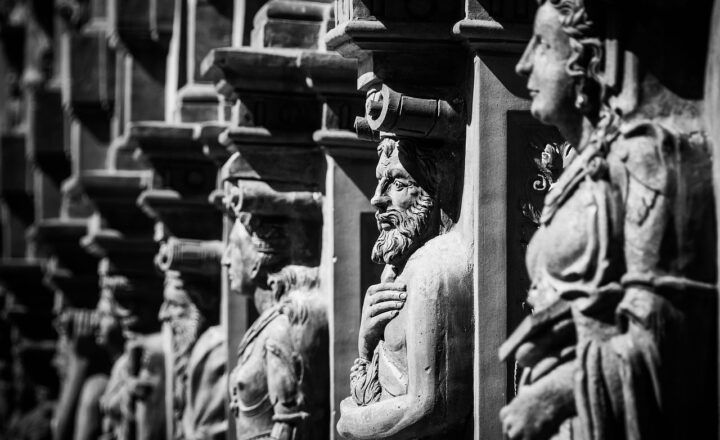The Role of Political Philosophy in Shaping Modern Constitutions
November 16, 2024

Political philosophy plays a crucial role in shaping modern constitutions, influencing the structure of government, the relationship between citizens and the state, and the principles of justice, liberty, and equality embedded in these foundational documents. Understanding the evolution and impact of political thought is essential to grasp how contemporary governance systems operate. This article explores the significant contributions of political philosophy in crafting modern constitutions and examines its implications on society.
1. The Foundations of Political Philosophy
Political philosophy dates back to ancient civilizations, with thinkers like Plato and Aristotle laying the groundwork for the discourse around governance, justice, and the role of individuals within a state. Their ideologies often contrasted, with Plato advocating for a philosopher-king model where wisdom leads governance, and Aristotle emphasizing the importance of a balanced government structure based on the concept of the ‘golden mean’. These formative ideas continued to evolve through the ages.
The Renaissance ushered in a new wave of political thought, with Machiavelli’s pragmatic approach to power dynamics marking a shift toward realism in politics. On the other hand, Enlightenment philosophers such as John Locke, Thomas Hobbes, and Jean-Jacques Rousseau contributed concepts that are foundational to many modern constitutions. Locke’s theories on natural rights, Hobbes’ social contract, and Rousseau’s ideas on general will and popular sovereignty have influenced the principles upon which contemporary governments are based.
2. The Influence of Enlightenment Thought
The political landscape experienced dramatic transformations during the Enlightenment, leading to revolutions that sought to implement the ideals of liberty, equality, and fraternity into governance structures. Enlightenment thinkers argued that government is formed by the consent of the governed, a principle that is echoed in many modern constitutions. This idea laid the groundwork for democratic principles and human rights.
**Key Contributions Include:**
- Natural Rights: Locke’s assertion that individuals possess inherent rights to life, liberty, and property shaped the Bill of Rights in the United States Constitution and similar documents across the globe.
- Social Contract Theory: The idea that governments derive their authority from the consent of the people forms the backbone of democratic governance, as seen in the preambles of many constitutions which emphasize the will of the people.
- Separation of Powers: Montesquieu’s philosophy on the separation of powers laid the foundation for checks and balances in government, influencing numerous constitutions by advocating for an independent judiciary, legislature, and executive branch.
The adoption of these Enlightenment ideas during the 18th and 19th centuries was pivotal for constitutions, moving societies toward forms of governance that respected individual freedoms while ensuring governmental accountability.
3. Case Studies: Constitutions Influenced by Political Philosophy
Understanding how political philosophy has specifically shaped modern constitutions is best illustrated through historical case studies.
**1. The United States Constitution:**
Drafted in 1787, the U.S. Constitution is a testament to Enlightenment ideals. The document embeds the principles of popular sovereignty, the rule of law, and individual liberties. Of critical importance is the First Amendment, which guarantees freedoms concerning religion, expression, assembly, and the right to petition the government.
**2. The French Declaration of the Rights of Man and of the Citizen:**
Adopted in 1789, this foundational document expresses ideals rooted in Enlightenment thought. It articulates fundamental rights and principles of equality, reflecting Rousseau’s emphasis on collective rights and democratic governance.
**3. South Africa’s Constitution of 1996:**
This constitution emerged from the anti-apartheid movement, representing a significant evolution in political thought. It is heavily influenced by concepts of human rights and dignity, drawing upon the moral philosophies surrounding justice and equality that gained prominence throughout the 20th century.
Each of these constitutions illustrates the direct impact of political philosophy in defining the role and limitations of government, ensuring the protection of individual rights and the establishment of democratic institutions.
4. Ongoing Relevance of Political Philosophy in Modern Constitutions
Political philosophy remains vital in shaping modern constitutions as societies evolve and face new challenges. The proliferation of global issues such as climate change, digital privacy, and social justice require a reevaluation of foundational principles.
**Emerging Themes Include:**
- Environmental Justice: Political philosophers explore the responsibility of governments to protect the environment, influencing constitutional amendments and frameworks aimed at safeguarding ecological rights.
- Social Justice Movements: The impact of movements advocating for racial equality, gender rights, and LGBTQ+ rights reflect the evolving interpretation of liberty and equality that continues to shape democratic institutions worldwide.
- Globalization and Human Rights: The rise of transnational issues demands innovative applications of existing constitutional rights, creating dialogue around the universality of human rights in a globally interconnected society.
Ongoing debates surrounding these themes showcase political philosophy’s enduring power to frame discussions about justice, governance, and society’s values.
5. Conclusion: The Lasting Impact of Political Philosophy
Political philosophy’s influence on modern constitutions is profound and pervasive. From the creation of foundational documents to ongoing updates responding to global challenges, political philosophy provides the tools necessary for critiques, interpretations, and the evolution of governance systems.
Understanding the historical and contemporary roles of political philosophy enables individuals to appreciate the complexities of their own democratic systems and the importance of engaged citizenship. By studying political philosophy, we prepare to address the challenges of modern governance while aspiring to the higher ideals of justice, equity, and human rights that underpin our societies.
As we reflect on the role of political philosophy in shaping modern constitutions, it becomes clear that the dialogue around governance, rights, and responsibilities is far from over. As societies continue to evolve, so too must the philosophical underpinning of their constitutions, ensuring they remain responsive to the needs of their citizens in a rapidly changing world.






